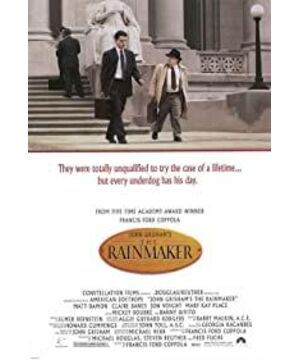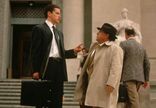This is actually a bit curious. In a society under the rule of law, the role and obligations of lawyers are actually very important. The maintenance and pursuit of justice cannot be separated from the efforts and dedication of professional legal professionals. The film "The Rainmaker" is adapted from the novel of the same name by the famous American best-selling novelist John Grisham, and it seems that this issue is also being discussed. The author does not deny the importance of lawyers, but rather criticizes lawyers who are motivated by profit and money in their work, and gradually lose their ideals when they were young. He made a direct comparison between a young lawyer who just graduated from university and a group of senior lawyers, and asked them to speak for the opposite interests of the two parties directly in a court: one represents the disadvantaged group, and the other represents the disadvantaged group. For large companies, this contrast and contrast are extremely strong.
I think the movie itself is well arranged, very compact and exciting. But the moral of the story is a bit superficial and simplistic. The ideals and enthusiasm of the young lawyer in the film are indeed very touching and precious; however, what we should pay more attention to is not who he chooses to speak for and what kind of interests he speaks for, but his careful work and his face. Responsible attitude towards the parties. Because the judicial system itself is antagonistic, facts and justice can only emerge more clearly after the confrontation of opinions. No lawyer is qualified to stand on the commanding heights of morality and first examine the client before deciding whether he is willing to act. Its endorsement. In fact, such an act of wise protection is actually very selfish. On the other hand, no matter how sinful and ugly an individual or organization is, it should also have the right to enjoy fair, just and reasonable treatment in the judicial system. As a part of the judicial apparatus, lawyers, in any case, when facing anyone They are all responsible for fulfilling their obligations and completing their own work-this is the most basic moral requirement of a lawyer. What's more, speaking for the devil does not mean that you have to become the devil yourself. You can still only tell the truth when defending a liar. I remember that when freshman was on the "British Judicial System", there was a special lesson on the professional ethics of judicial workers. The first requirement for lawyers is the so-called "Cab rank rule": lawyers and clients are like taxis. The relationship between the driver and the passenger, or the relationship between the doctor and the patient, the lawyer cannot refuse to represent anyone, just as the driver cannot refuse to carry, the doctor cannot see that the patient is a murderer and will not save him.
Of course, in reality, more lawyers may be reluctant to defend certain parties because of the lack of agency fees. Large enterprises and large companies have rich wealth, and they have the money to hire many excellent lawyers to advocate for their interests; and many poor people may not be able to afford the high litigation costs, and risk agents have emerged as the times require. Traditional lawyers generally charge hourly fees, and the rate of course also depends on the lawyer's reputation, experience and level. The risky attorney does not charge any fees to the client in advance, and only draws a percentage from it when he wins the lawsuit and obtains compensation for the client. The film obviously supports the approach of risk agency, because it opens up a shortcut for the poor to file a lawsuit, and justice seems to be better protected.
But in fact, apart from the United States, few countries allow risk agents. One reason may be that risk agency may encourage an unhealthy litigation culture: the cost of litigation for the parties is close to zero, but the possible benefits are very high, so small things like drinking coffee to burn your tongue and other big ass are also involved. Going to court, if you can't make it right, you can even get a lot of money, but the entire process has seriously wasted the already very limited judicial resources and brought huge social costs. Moreover, the reason why risk agency can be so successful in the United States is also related to another special legal system in the United States-punitive damages. Few countries in the world allow the existence of so-called punitive damages in civil disputes like the United States. Traditional judicial theory has always believed that when a person's interests are violated, the law has the responsibility to correct the mistakes and restore the damaged interests, but that's all. For example, if the defendant steals one dollar from the plaintiff, the most reasonable judicial compensation in civil terms should be to let the defendant return that dollar. The punitive damages will require the defendant to pay the plaintiff a sum of money on the basis of that dollar as punishment for his actions. This is actually a bit unreasonable logically: if the rights of individuals in criminal cases should be more protected in the face of powerful state machinery, their rights and obligations in civil disputes should be completely equal. If the defendant made a mistake, let him correct the mistake. If the punishment is to be punished by the state through the criminal trial procedure, why should he be forced to compensate the plaintiff beyond the scope of his obligation? Doesn't this hurt the defendant's rights? The balance of the law should remain completely fair, and should not be tilted towards either the plaintiff or the defendant, even the more vulnerable party.
Therefore, the punitive damages system in the United States provides a basis for the popularity of risk agents. Because individuals are likely to receive compensation beyond the normal compensation limit in civil disputes, risky attorneys are willing to take the risk of not taking any money to help their clients in lawsuits, hoping to obtain greater benefits through commissions. The movie portrays the fledgling risk attorneys as high-spirited and full of ideals, which actually simplifies the image of this kind of lawyer: in fact, in the United States, the income of successful risk attorneys may be the highest of all lawyers, or even more. Financial lawyer on Wall Street. And their reputation is actually not very high. To be honest, they may really be very much like the so-called "lawsuit" in ancient China: with their three-inch tongue, they incited the jury to pay sky-high compensation, and draw oil and water from it. .
This also reflects a frequently criticized problem in the American judicial system. The jury system is a major feature of the Anglo-American legal system, and it works perfectly in many ways. But only in civil dispute cases in the United States, the jury can not only make a verdict on the outcome of the case, but also determine the amount of compensation—that is, the jury can not only decide the case, but also send the sentence. If the ruling itself can be regarded as guided by professionals, and ordinary people can make decisions based on common sense, sentencing is a professional skill that highly depends on experience. Only a professional judge who is very familiar with other similar cases and has a thorough understanding of the legal provisions can probably make accurate judgments and make a reasonable sentence. Otherwise, the amount of compensation given by each jury is different, and it often depends more on the success of the lawyers' sensationalism than on the precedent or the law itself. So how can fairness be maintained? It's no wonder that punitive damages in the United States will continue to explode tens of millions or even hundreds of millions of sky-high compensation, and risky attorneys have also made a lot of money.
View more about The Rainmaker reviews











